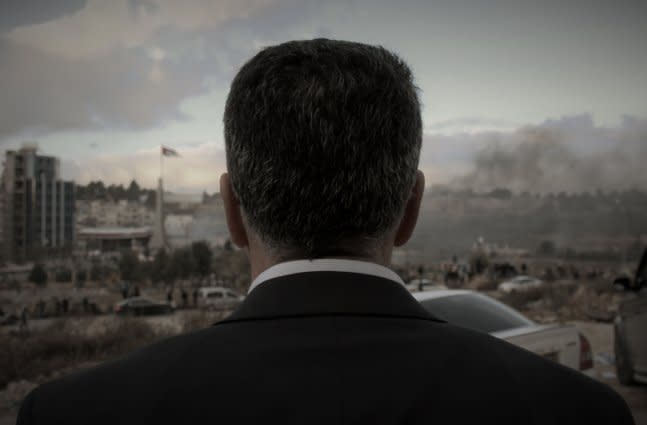‘Mayor’ Review: The Best New Film About Israeli-Palestinian Conflict Is a Dark Comedy About Ramallah’s Mayor


Ramallah is only 10 miles north of Jerusalem, but for Palestinians living under occupation, the distance feels much longer. In “Mayor,” a thrilling and perceptive new documentary from director David Osit, the normalcy of everyday life faces the constant threat of disruption. That’s the conundrum facing Musa Hadid, the overworked protagonist at the center of an operatic vérité drama that often dips into bureaucratic black comedy and unnerving suspense, as Hadid’s exasperated attempts to keep the peace dissolve into a constant swirl of frustration.
There have been countless documentaries made about the West Bank experience, from “5 Broken Cameras” to “The Settlers,” and they often involve the travails of ordinary life existing side by side with military persecution. “Mayor” offers a striking new perspective on that struggle, with a personal on-the-ground quality matched by grand tonal ambitions that makes it the best of its subgenre.
More from IndieWire
Unfolding across several months in 2017, the movie follows Hadid as he attempts to formulate a vision for Ramallah rich with the cosmopolitan potential of its Israeli neighbors, yet hamstrung by violent protests and invasive soldiers at every turn. Adorned in a trim mustache and immaculate suits, Hadid is an espresso-sipping sophisticate at odds with the limitations of his environment. His muted, deadpan gaze suggests a real-life variation of the silent slapstick figure played by Palestinian filmmaker Elia Suleiman in his embellished comedies of life under occupation. At the same time, Hadid provides a cogent metaphor for Ramallah’s embrace of modernity despite the pratfalls at every corner. Does his commitment stand for a better future — or represent the vanity of a lost cause?
These questions would make for a compelling enough non-fiction enterprise, but Osit’s filmmaking draws out the inherent irony of his subject’s mission. Opening credits announce a big-screen epic of “Exodus” proportions, as an enthralling orchestral score (credited in part to the Japanese musical collective Geinoh Yamashirogumi) accompanies a map of the region, and credits recount the impact of Israel’s occupation on Palestinian life in the aftermath of the Six-Day War in 1967. That was when Israel captured the region and left Ramallah’s citizens to sort through the ambiguity of the sovereign state it remains to this day. As the hub of Palestinian governance, Ramallah is at once an established metropolis and the literal shadow of its Big Brother, with gun-wielding Israeli troops lingering on the border — and sometimes crossing the line.
The mayor wrestles with that contradictory existence early on, arguing through an aimless staff meeting about the city’s cheeky “WeRamallah” slogan before emerging to the street, where he walks past the word in giant letters on the street. After announcing Ramallah as a “city in transition,” he spends much of the movie focused on superficial means of bolstering that claim, from the city’s neon Christmas tree to elaborate plans for an exuberant fountain at the center of town. It’s fascinating to watch him shift between private and public moments, messaging a bold vision of national pride while acknowledging the hardships bottling it in.
Osit’s rambling narrative approach doesn’t bother to explain every nuance of the drama at the border, instead allowing broader developments to seep into the scene. In the midst of a conversation with a local priest, Hadid learns of Donald Trump’s decision to recognize Jerusalem as Israel’s capital, pushing back on longstanding Palestinian claims to the region and exacerbating tensions. Hadid even takes a trip to the border himself, where he gets so close to a sudden showdown with troops that the bullets wisp past the camera, as “Mayor” tips into a dangerous sequence where the filmmaking itself seems to enter the crosshairs.
That close call turns out to be a mere inflection point to set the stage for the more harrowing showdown later in the movie, as Israeli troops march around outside Hadid’s office in an unusual show of force, for no other apparent reason other than to inject fear into their surroundings. Osit’s camera watches from afar as Hadid collapses into an office chair on the outskirts of his building, in a surreal image that suggests his surroundings have melted around him. “God help us,” he sighs, as his fountain fires off to the sky, in a majestic punchline that plays like a punch to the gut.
Grade: A-
“Mayor” premiered at the 2020 True/False Film Fest. It is currently seeking U.S. distribution.
Best of IndieWire
The Best Animated Films of the 21st Century Ranked, From 'ParaNorman' to 'Spirited Away'
Movie Ticket Subscription Plans Ranked: Where to Put Your Money in a Post-MoviePass World
Sign up for Indiewire's Newsletter. For the latest news, follow us on Facebook, Twitter, and Instagram.

